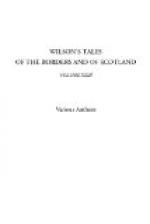“Follow me, Charles,” he said; and Mr. Sim accompanied them. They entered the churchyard; the colonel led them to the humble grave-stone that he had raised to the memory of his Maria. He sat down upon it, he pressed his lips to it and wept.
“Charles,” said he, “look on your mother’s grave. Here, on this stone, day after day, I was wont to sit with you and your brother upon my knee, fondling you, breathing your mother’s name in your ears; and though neither of you knew what I said, you smiled as I wept and spoke. Oh Charles! though you then filled my whole heart (and you do now), I could only distinguish you from each other by the ribbons on your arms. Would to Heaven that I may discover my child! and, whatever be his condition, I shall forgive my father for the injustice he has done me and mine—I shall be happy. And, oh! should we indeed find your brother—should he prove to be the youth whom you have twice met—I shall say that Heaven has remembered me when I forgot myself! But come hither, Charles—come, kneel upon your mother’s grave—kiss the sod where she lies, and angels will write it in their books, and show it to your mother, where she is happy. Come, my boy.”
Charles knelt on his mother’s grave. He had arisen, and they were about to depart; for his grandfather had accompanied them, and was a silent but tearful spectator of the scene.
They were leaving the churchyard, joined in the arms of each other, when two strangers entered it. The one was John Bell, the other George Prescot.
“Colonel! Colonel! there is John Bell that you spoke of,” exclaimed Mr. Sim.
“Father! father!” at the same instant cried his son, “he is here—it is him!—my brother—or—he whom I have told you of, who so strangely resembles me.”
Charles rushed forward—it was George Prescot—and he took the proffered hand of the other, and said, “Sir, I rejoice to meet thee again—it seems I belong to Cumberland as well as thou dost; and this gentleman (pointing to John Bell), who seems to know more of me than I do myself, has promised to show me here my mother’s grave!”
“And where is that grave?” cried the colonel earnestly, who had been an interested spectator of all that passed.
“Even where the wife of your youth is buried, your honour,” answered John Bell; “you have with you one son—behold his twin brother!”
The colonel pressed his new-found son to his breast. With his children he sat down on the stone over Maria’s grave, and they wept together.
Our tale is told. Colonel Morris and his sons had met. His elder brothers died, and he became the heir of his father’s property. Mr. Sim also stated that, in his will, he should divide his substance equally between the brothers; and he did so. I have but another word to add. George forgot not Caroline Paling, who had assisted him when his heart was full and his pocket empty, and within twelve months he again visited Dartmouth; but when he returned from it, Caroline accompanied him as his wife; and when he introduced her to his father and his brother—“Behold,” said he, “what a halfpenny, delicately tendered, may produce.”




